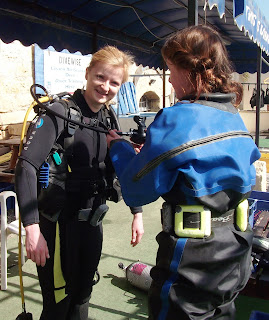When I first came to Malta last year I quickly learnt that, like when you visit any new place, there are some things you wish you had been aware of that I imagine none of the guide books tell you. So I have come up with some advice for those first timers!
It’s a bit quiet today at Divewise. A lot of the staff are feeling under the weather. Viv is off with a bad cold and Jack’s taken the day off with her, though the amount of times I’ve rung her with questions and the fact there are builders upstairs I imagine she’s not getting that much rest.
Tip #1– Choose an apartment where possible it is not near a building that is under construction or you will be woken up by loud building noises at 6am.  If you’re staying in a hotel you’ll be fine but won't hurt to ask if there is any building work going on nearby.....if you like a peaceful morning
If you’re staying in a hotel you’ll be fine but won't hurt to ask if there is any building work going on nearby.....if you like a peaceful morning

Nev is also off with a “cold” although he had a rather dodgy bowl of cereal the other morning which might have been the real reason......
Tip #2– always check the sell by date on food in the supermarkets as we have found the odd packet of biscuits or bag of crisps that has expired but this can happen anywhere even in your local store.....bit disappointing when you find they are stale

When I was last here I lived out in Birkirkara – it’s about a 3.5km walk to St Julians. First I got a taxi home because I didn’t know the way.
Tip #3 – Use the buses. They may have been built in Leyland and occasionally break down but they are very cheap and good fun.
So I tried getting the bus home.
Tip #4 – The locals love to help you with directions so don't be afraid to ask - they will tell you to go straight, straight then left or right but remember to ask if it is the first or second left/right as they tend to leave that important detail out...... and makes me smile. As a general rule all buses go to Valletta, so if you’re not sure where to go head to Valletta then catch a bus from there which is the main terminus
Tip #5 – When waiting for a bus that is going somewhere a bit off the standard tourist routes, don’t sit there until you get stuck in the mental dilemma that I once had like .... "ok I’ve been here two hours now, if I get up and leave a bus will come" ... eventually I left and had to chase the bus to the next stop and there are some epic hills in Malta.
Tip #6 – Don’t always trust the church clocks – one of the two can be wrong. The Maltese do it deliberately so the devil doesn’t come to mass.
Tip #7 – The local beer is called Cisk. To avoid sounding like an idiot and having the barman stare at you with a confused expression while you act out drinking a pint – it’s pronounced Chisk.

Tip #8 – Wear sun cream. Even when you’ve been here for months. You don’t know where and when you’ll end up falling asleep and the sun is exceptionally strong here.....
Tip #9 - Drive like you don’t know how to and you’ll fit right in. But drive SLOWLY when the road is wet.
Tip #10 - Take care using Zebra Crossings as the traffic doesn't always stop so tread cautiously!

and the most important tip of all .....

Come diving with Divewise!
There’s probably more but these are the ones that I wish someone had told me.
 If you’re watching the news at the moment, wherever you are in the world, I imagine you will have been hearing a lot about the earthquake and Tsunami in Japan. Some of Anne’s family live in Tokyo, so we’ve been trying to offer some support to Japan through this very sad time.
If you’re watching the news at the moment, wherever you are in the world, I imagine you will have been hearing a lot about the earthquake and Tsunami in Japan. Some of Anne’s family live in Tokyo, so we’ve been trying to offer some support to Japan through this very sad time. 


















 And Alan may dispair ......
And Alan may dispair ......




























